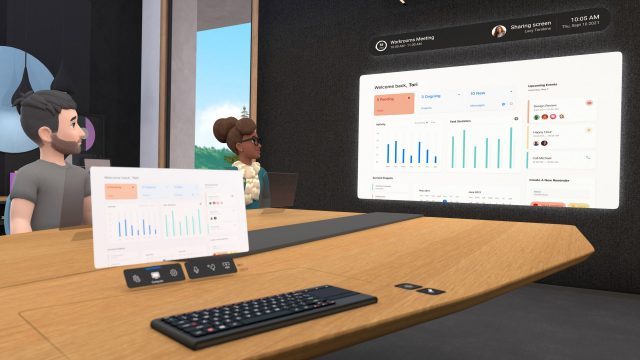Facebook’s Latest Avatars

Horizon Workrooms is using Facebook’s latest VR avatars, and I have to say that they’re a huge step forward compared to the prior avatar system. While they technically launched earlier this year, only select third-party developers have access to the system, making them currently a fairly rare sight.
My demo in Horizon Workrooms was the first time I saw the new avatars in a large group setting. While they can look a bit uncanny at times when their arms get a jumpy due to Quest’s imprecise hand-tracking, overall they look great. Especially combined with impressive lip-syncing and spatial audio that’s built into Horizon Workrooms. Here’s a close-up look from my demo (unmute for sound):
A Step Forward for Productivity on Quest
Quest is, at its core, still a gaming device. Horizon Workrooms is clearly an effort on Facebook’s part to bring collaboration and productivity capabilities to the headset. In that sense it feels like it has taken a step forward. Though it’s far from perfect, and there’s many other VR collaboration apps to choose from with features not found in Horizon Workrooms.
If Horizon Workrooms is to truly succeed, it will need to respond aggressively to feedback to build on the ways that people actually work, while continuing to make the app as easy to use as possible so that people see true utility and not just novelty. It’s also going to need to tighten up the virtual desktop functionality so that it doesn’t feel like a compromise compared to using your actual computer.
At the same time, Horizon Workrooms feels like it’s not addressing a more fundamental issue. It’s great that Facebook is allowing people to form teams, invite members to those teams, and then schedule virtual meetings for everyone to show up to at the same time. But Quest is still missing casual VR meeting functionality intended for general use-cases and not purely business—it feels a lot like having a smartphone that can make business calls but not personal calls.
Even though it’s free and technically anyone can use it, Horizon Workrooms has too much administrative overhead to address the regular, everyday users who just want a way to easily invite a friend to a shared virtual space to hang out and chat. Building up from those simple, personal meetings to more high-level business meetings seems like it would have addressed a much wider range of needs. At the same time, I can appreciate that Horizon Workrooms is focusing on a very specific use-case.






